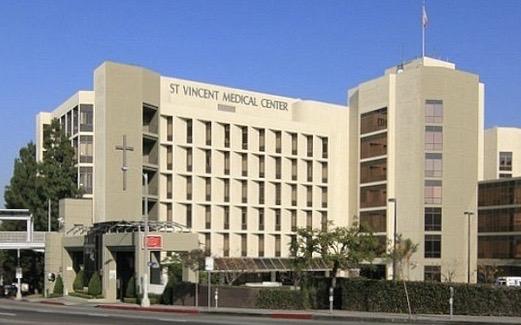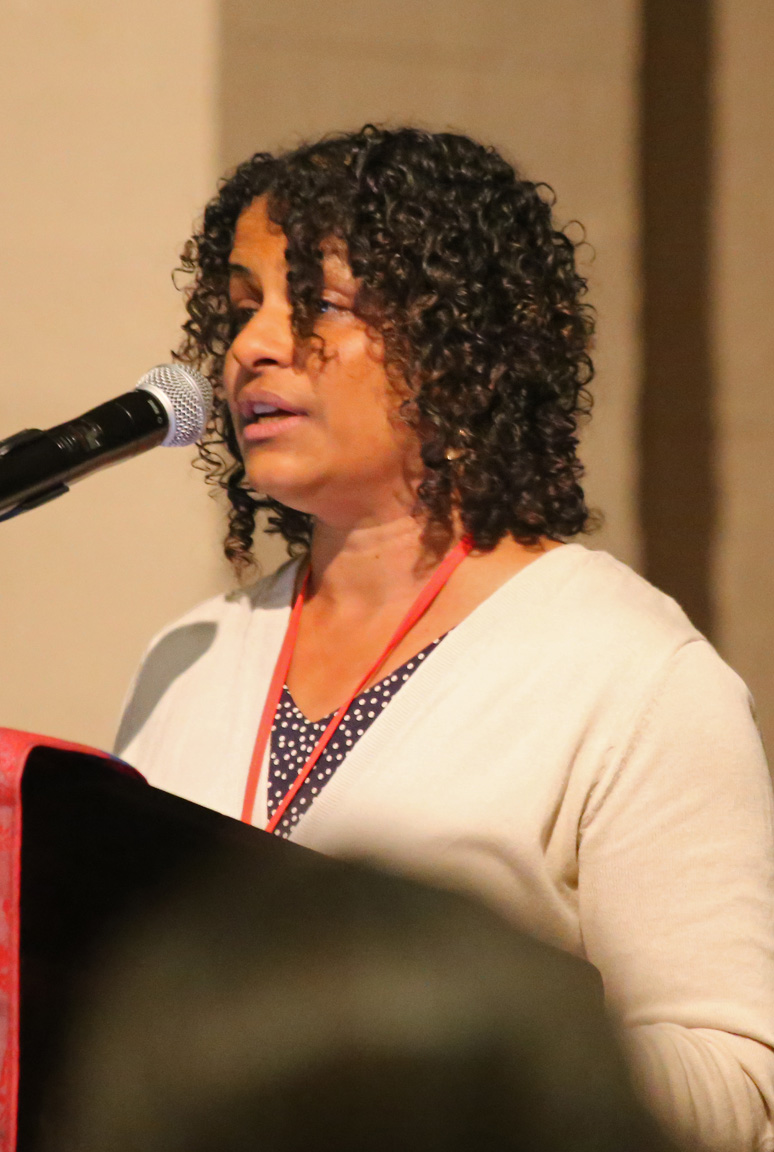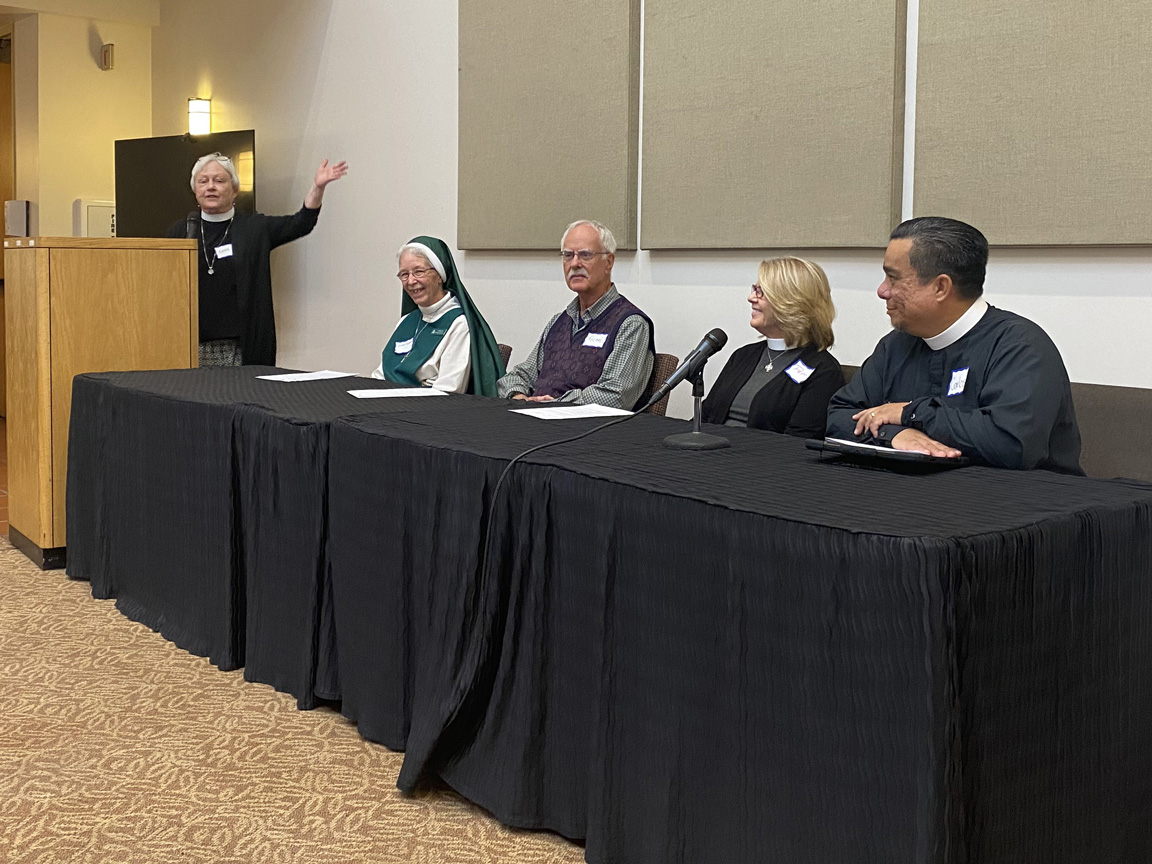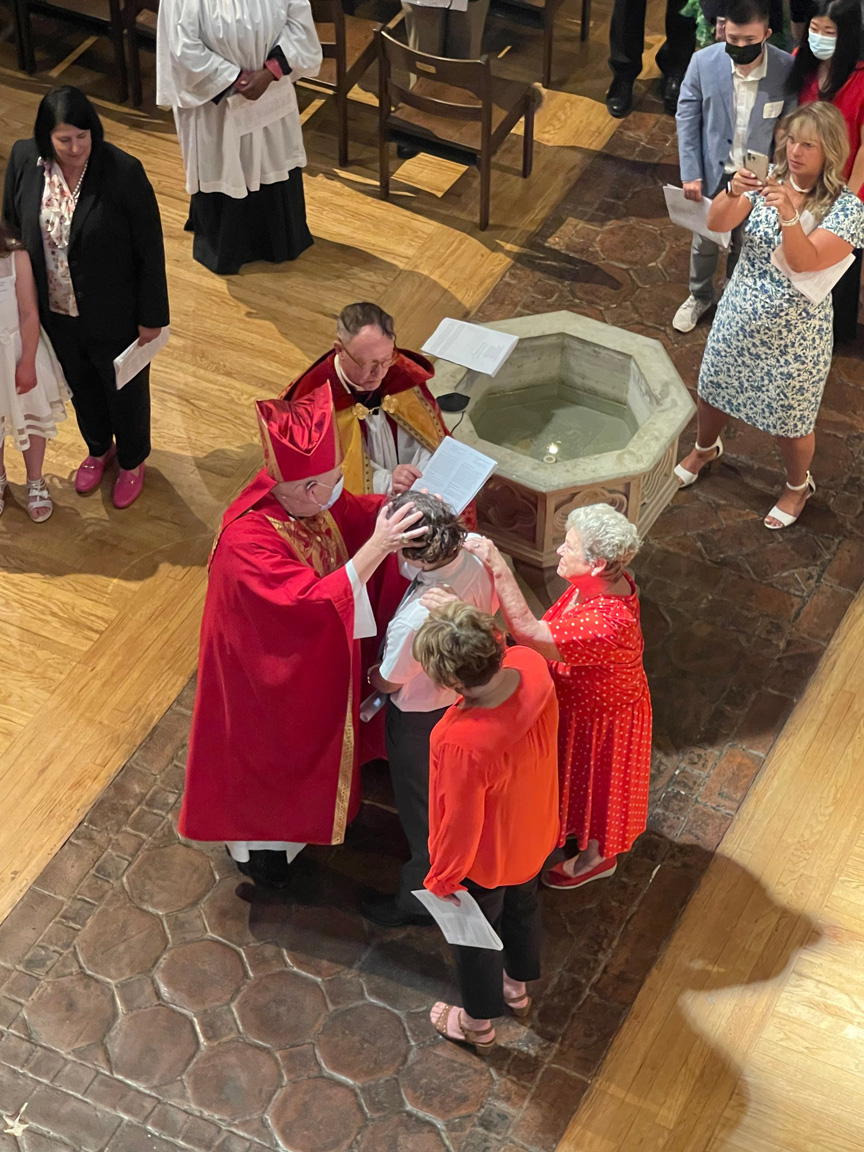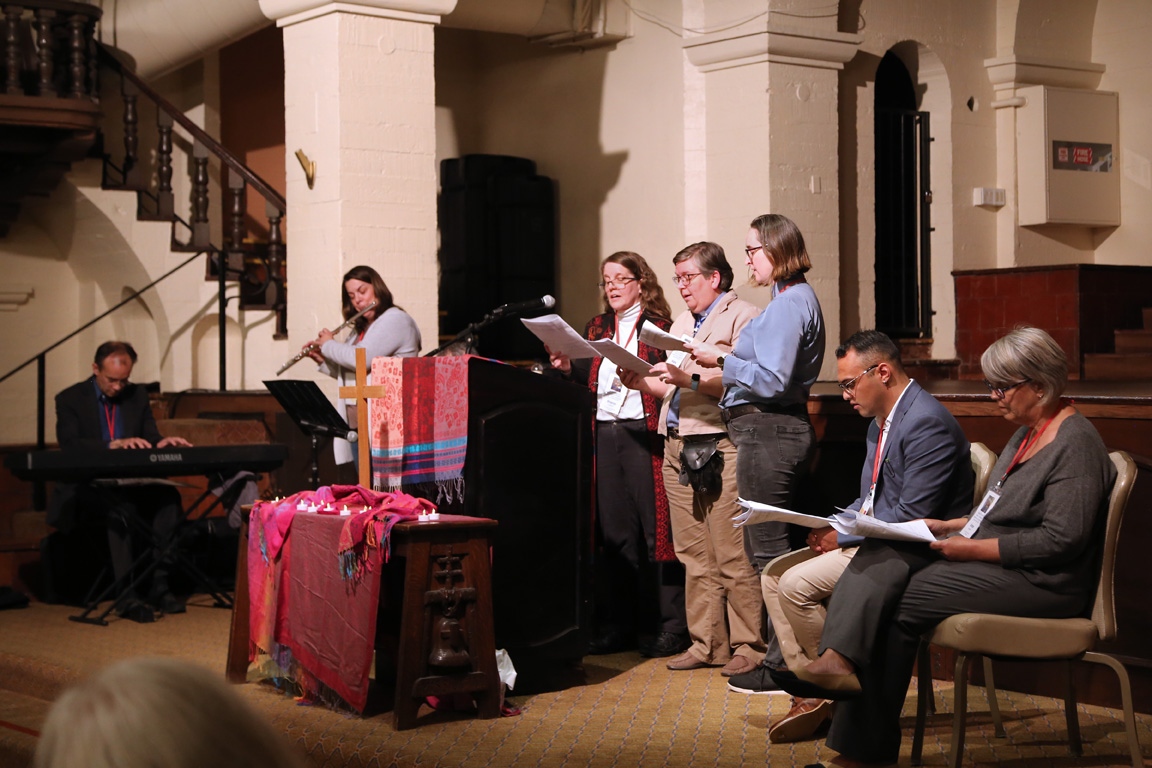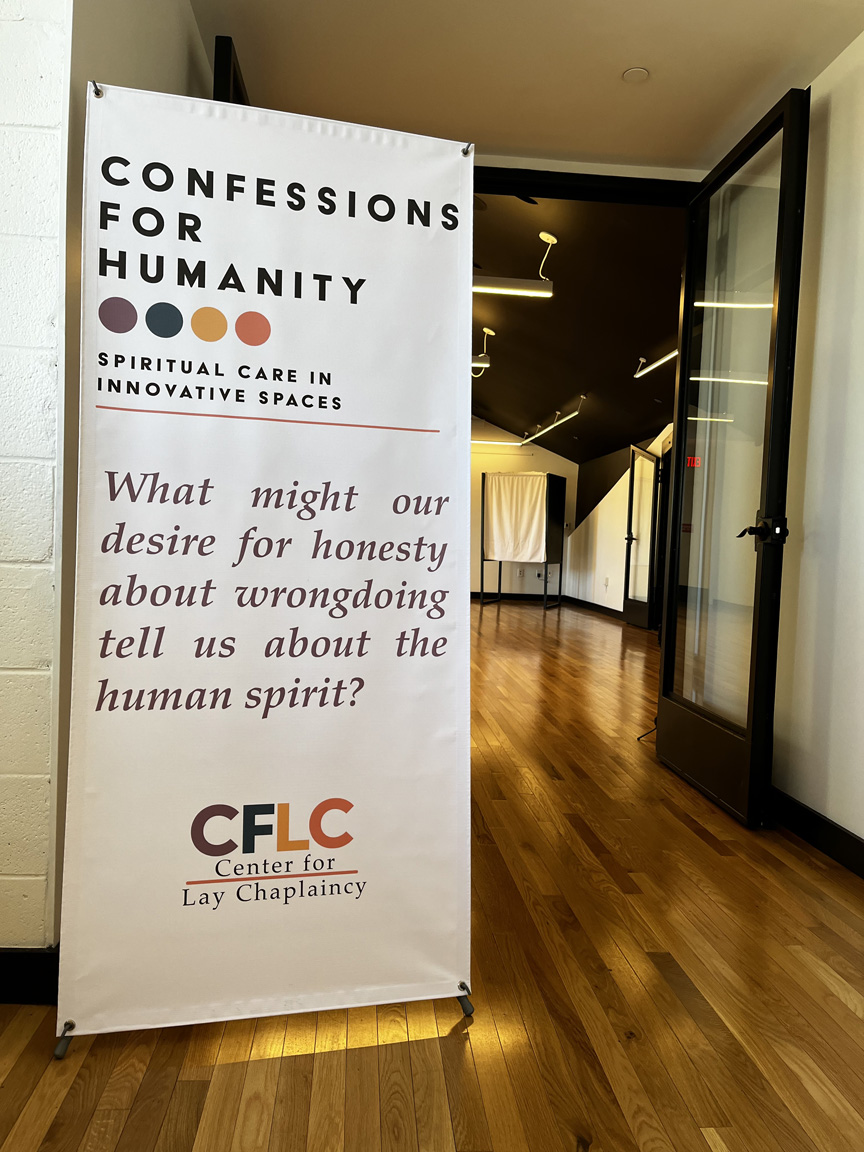Lay Leadership Licensing
All Episcopalians are invited into ministry and make a commitment to it at baptism; and we reaffirm both the invitation and commitment regularly. This baptism into the Episcopal branch of the Jesus movement is also the core requirement for engaging in lay ministry in our church.
Certain ministries, as outlined in the Constitution and Canons of the Episcopal Church, are lifted up by an official licensing and training process allowing those who are licensed an even greater scope and authority in their work. Each diocese defines its own requirements and guidelines for selecting, training, licensing, and deployment of lay persons in these ministries. Each ministry, its competencies, and its training requirements are described in detail below.
Bloy House, the theological school for the diocese, has designed short and affordable courses to meet these competencies, and the Center for Lay Chaplaincy provides the specific training for chaplains.
About the Process
Application & Licensing Process Detail | List of Requirements for all Licensed Ministries | Training Resources | FAQ
About the Ministries
Eucharistic Minister | Eucharistic Visitor | Preacher | Evangelist | Catechist | Pastoral Leader | Worship Leader | Parish & Diocesan Chaplain
Application and Licensing Process
Each ministry has an individual application, found through the ministry information below. (Note: All existing lay ministers who may have been licensed sometime in the past will need to go through the initial application process to review their training and establish their licenses. The steps for application and licensing are described here.)
- The applicant should review the application and requirements with their recommending clergy/leader.
Note: While it is highly encouraged to complete all the training, individual training requirements can be waived by the recommending clergy/leader based on previous trainings and/or life experience. - A preliminary application can be filled out online, or the application can be filled out once all training is complete. If the training is not complete at this time, the applicant should press “SAVE” to save the progress and keep the application open until it is complete. Certificates of courses taken, evaluations, etc. will need to be uploaded with the application. In addition, a signed letter of recommendation from your recommending clergy needs to be uploaded.
- SAVED applications can only be accessed by the applicant using the special link that Cognito sends in a confirmation email.
- Once all training requirements have been complete, and all documents uploaded, complete the application by clicking SUBMIT.
- A processing fee of $25 will be collected for a background check and other processing costs.
Note: If financial assistance is needed for the fee, the applicant should consult with their recommending clergy/leader and/or the Commission on Ministry. The application fee should never be a barrier to becoming licensed. - The applicant will receive a confirmation email after submitting the application. Once submitted, the application cannot be changed by the applicant. The application will be reviewed and processed by a Deanery Manager – a volunteer from each deanery who will work within the diocesan Realm software to move the application along.
Note: Once an application is submitted, it cannot be revised. If changes are necessary, the applicant can work with the Deanery Manager to upload new documentation, or a new application can be submitted. - After review by the Deanery Manager, the Commission on Ministry will review the application, and pass it on to the Bishop’s office, where it is reviewed and a background check is performed and evaluated.
- Once approved by the Bishop’s office, a certificate is prepared and emailed to the applicant, and the recommending clergy/leader is notified.
- The license is required to be renewed every three years. The renewal application is filled out online and processed in the same way.
Please review the FAQ for additional information. You can also contact Bloy House Dean, Linda Allport, at lallport@bloyhouse.org with any further questions.
Requirements Common to all Licensed Ministries
- Nominated by parish clergy, confirmed by the vestry, approved by the Bishop
- Confirmed communicant in good standing and active in parish life
- Embody the values of the Baptismal Covenant
- A background check is performed and evaluated
- Completion of Safe Church, Safe Communities Training
(See here for an explanation of the Episcopal Church policy on this. Safe church training is done through local congregations, who have instructions for anyone to get the training. Please contact anilincollado@ladiocese.org if your congregation does not have a Safe Church account. If your church is in transition, your dean should be able to assist as well.) - Completion of Anti-Racism training through Bloy House or other institution, in accordance with a resolution of the 2000 General Convention that “the lay and ordained leadership of the Episcopal Church, including all ordained persons, professional staff, and those elected or appointed to positions of leadership on committees, commissions, agencies, and boards be required to take anti-racism training and receive certification of such training.”
- Completion of Episcopal Identity training through Bloy House or similar course through another institution. Note: Episcopal Identity is not required for Eucharistic Ministers, but is recommended.
(Episcopal Identity is an exploration of the modern Episcopal Church – its theology, its worship and community, its history, and organization. A deeper dive than a confirmation class, this training is presented from a lay ministry point of view.) - Completion of additional coursework and training for the particular ministry as detailed below. (Note: certain training can be waived on the application.)
Training Resources
- Bloy House, the Episcopal Theological School for the Diocese of Los Angeles
https://www.bloyhouse.org/programs - Instituto de Liderazgo (Spanish) or Li Tim Oi Center (Mandarin) offer non-English formation programs in the Diocese of Los Angeles
https://www.bloyhouse.org/programs - Lay Clinical Pastoral Education Levels 1 and 2, Center for Lay Chaplaincy
https://www.thecflc.org/cpe
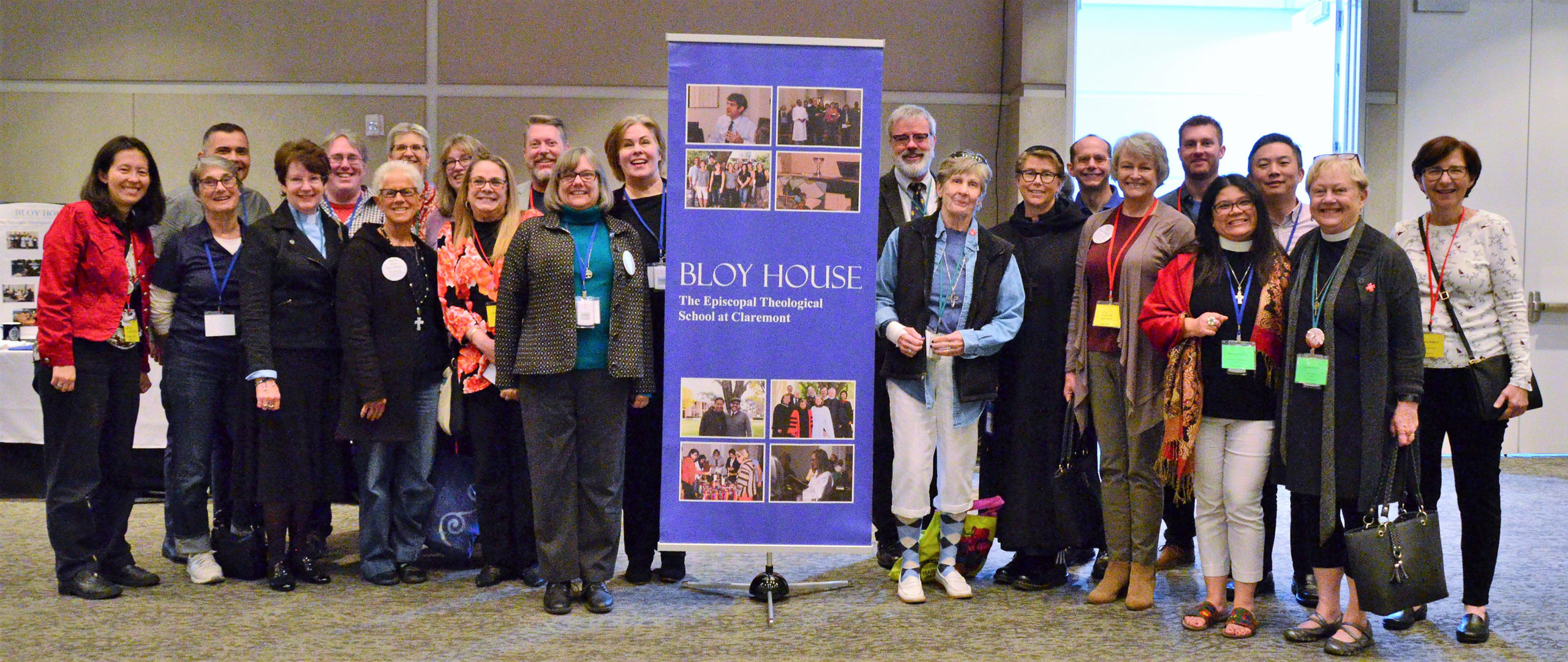
Eucharistic Minister
A Eucharistic Minister is a lay person authorized to administer the Consecrated Elements at a Celebration of Holy Eucharist. A Eucharistic Minister should normally act under the direction of a Deacon, if any, or otherwise, the Member of the Clergy or other leader exercising oversight of the congregation or other community of faith. (Canon III, 4, Sec. 6)
Competencies:
- Love of and knowledge about Episcopal liturgy
- Able to participate in a worship team and adapt to changing circumstances
- Welcoming personality at the altar
Specific Training Requirements:
- Completion of training in worship activities specific to the local congregation. Training done by the local clergy or experienced person designated by the clergy/congregational leader.
Eucharistic Visitor
A Eucharistic Visitor is a lay person authorized to take the Consecrated Elements in a timely manner following a Celebration of Holy Eucharist to members of the congregation who, by reason of illness or infirmity, were unable to be present at the Celebration. A Eucharistic Visitor should normally act under the direction of a Deacon, if any, or otherwise, the Member of the Clergy or other leader exercising oversight of the congregation or other community of faith. (Canon III, 4, Sec. 7)
Competencies:
- Calming and friendly presence with those who might be infirm or distressed about their situation
- Curious, courteous, and open when meeting others in their home space
- Familiarity with the distribution of communion from the reserved sacrament and other appropriate liturgical practices
- Able to listen to and value differing points of view on theology and spirituality
Specific Training Requirements:
- Completion of training in worship activities specific to the local congregation. Training done by the local clergy or experienced person designated by the clergy/congregational leader.
Preacher
A Preacher is a lay person authorized to preach. Persons so authorized shall only preach in congregations under the direction of the Member of the Clergy or other leader exercising oversight of the congregation or other community of faith. (Canon III, 4, Sec. 5)
Competencies:
- Comfortable and adept at public speaking and communication
- Knowledgeable and curious about scripture and its interpretations
- Willing to spend time in research and sermon preparation
- Understands the intersection between preaching and Episcopal theology and liturgy
- Comfortable sharing their personal faith story. Able to inspire, encourage, and equip others in their faith through preaching
Specific Training Requirements:
(Bloy House course names listed below; other institutions may offer similar training)
- Introduction to Bible for Lay Preachers
- Beginning Preaching for Lay Preachers with Practicum
Recommended/Continuing Education:
- Storytelling for Lay Evangelists
- Advanced Preaching for Lay Preachers with Practicum
Evangelist
An Evangelist is a lay person who presents the good news of Jesus Christ in such a way that people are led to receive Christ as Savior and follow Christ as Lord in the fellowship of the Church. An Evangelist assists with the community’s ministry of evangelism in partnership with the Presbyter or other leader exercising oversight of the congregation, or as directed by the Bishop. (Canon III, 4, Sec. 9)
Competencies:
- Understands that evangelism is the responsibility of every Christian and thrives on encouraging others to live out this responsibility
- Practices patience, compassion, curiosity, openness, and trust
- Seeks to meet people where they are — being sensitive to their individual journeys of faith
- Able to effectively communicate and build relationships among people in our diverse communities
- Comfortable sharing their personal faith story. Able to inspire, encourage and equip others to share their faith stories, too
Specific Training Requirements:
(Bloy House course names listed below; other institutions may offer similar training)
- Introduction to Bible for Lay Preachers
- Multicultural Awareness for Lay Leaders
- Story Telling for Lay Evangelists
Catechist
A Catechist is a lay person authorized to prepare persons for Baptism, Confirmation, Reception, and the Reaffirmation of Baptismal Vows, and shall function under the direction of the Member of the Clergy or other leader exercising oversight of the congregation or other community of
faith. (Canon III, 4, Sec. 8)
Competencies:
- Demonstrated teaching/training skills, and organizational skills for formation
- Willing to research and prepare material independently
- Able to welcome others into the Episcopal Church, promoting the inclusive nature of the church
- The ability to relate effectively with diverse persons
- The ability to reflect deeply on their own belief system
Specific Training Requirements:
(Bloy House course names listed below; other institutions may offer similar training)
- Leading Adult Formation
- Detailed Episcopal Catechism
Recommended/Continuing Education:
- Introduction to Bible for Lay Preachers
- Multicultural Awareness for Lay Leaders
- Storytelling for Lay Evangelists
Worship Leader
A Worship Leader is a lay person who regularly leads public worship under the direction of the Member of the Clergy or other leader exercising oversight of the congregation or other community of faith. (Canon III, 4, Sec. 4)
Competencies:
- Ability to gather and lead groups, and the ability to relate effectively with diverse persons
- An understanding of the process of planning and preparing for a service of public worship
- Administrative and pastoral reporting procedures related to worship
- Leadership of the services of the Daily Office, Rites I and /or II, as presented in The Book of Common Prayer, in particular Morning Prayer as it would be used in a congregation.
- Familiarity with the distribution of communion from the reserved sacrament.
- Detailed knowledge of and the ability to utilize the Book of Common Prayer in the following areas: Pastoral offices found in the Book of Common Prayer; the procedures for emergency Baptism; liturgies of Ash Wednesday and Holy Week
- Familiarity with other appropriate liturgical resources such as the Book of Occasional Services, Holy Men, Holy Women, and the Enriching Our Worship series, and Episcopal hymnody.
- Understanding how to access scriptural reflections appropriate to be read at worship, and the ability to guide a communal Bible reflection in the context of worship.
- Comfortable sharing their personal faith story. Able to inspire, encourage, and equip others in their faith through preaching
Specific Training Requirements:
(Bloy House course names listed below; other institutions may offer similar training)
- Book of Common Prayer for Worship Leaders with Practicum
Recommended/Continuing Education:
- Introduction to Bible for Lay Preachers
- Leading Adult Formation
Pastoral Leader
A Pastoral Leader is a lay person authorized to exercise pastoral or administrative responsibility in a congregation under special circumstances, as defined by the Bishop. (Canon III, 4, Sec. 3)
Typically functions in the temporary absence of clergy at the local congregation, and may act as both a preacher and worship leader.
- Comfortable and adept at public speaking and communication
- Ability to gather and lead groups, and the ability to relate effectively with diverse persons
- Demonstrated administrative skills
- The ability to relate effectively with diverse persons
- The ability to compassionately assess the needs of others
- The ability to set healthy boundaries
- The ability to reflect deeply on their own belief system
- If functioning as a preacher or worship leader, see recommended training and competencies under those ministries
Specific Training Requirements:
(Bloy House course names listed below; other institutions may offer similar training)
- Introduction to Bible for Lay Preachers
- Beginning Preaching for Lay Preachers with Practicum
- Book of Common Prayer for Lay Worship Leaders with Practicum
- Pastoral Care for Lay Pastoral Leaders
Recommended/Continuing Education:
- Congregational Governance Training
- Story Telling for Lay Evangelists
- Multicultural Awareness for Lay Leaders
- Leading Adult Formation
- Advanced Preaching for Lay Preachers with Practicum
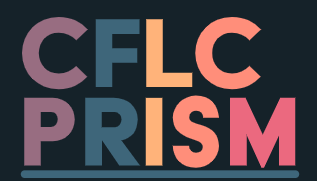
Parish & Diocesan Chaplains
Chaplaincy offers a unique – and much needed – ministry of listening, support, and spiritual accompaniment, for Parish Chaplains within their home parish community, and for Diocesan Chaplains ministries across EDLA. Questions about the chaplaincy ministry can be directed to the Center for Lay Chaplaincy.
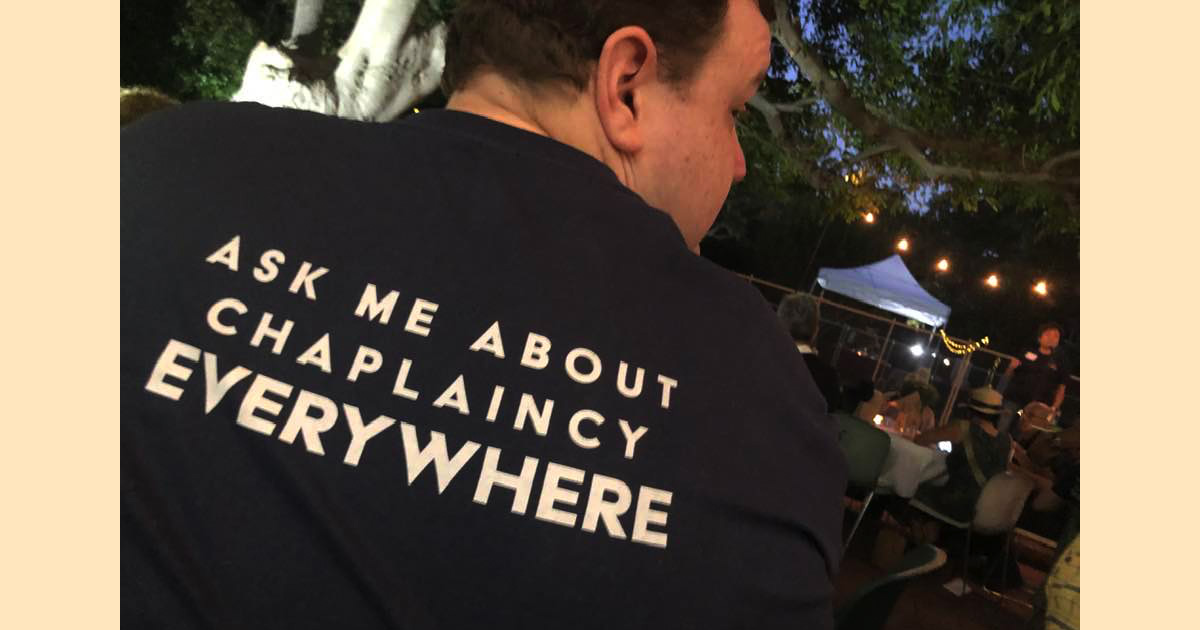
Parish Chaplain
Qualifications: (beyond those for all licensed ministries)
- A reconciling presence within their parish community and the capacity to listen beyond one’s own experience
Competencies:
Clinical competence, as evidenced by:
- Demonstrated ability to identify one’s own affective experience and differentiate one’s own experience from the care-seeker’s
- Demonstrated ability to describe narratives of dominance and sub-dominance and to explore one’s own implicit biases
- Demonstrated ability to establish a rapport and pastoral bond with parishioners in one’s own community who are in crisis, grief, loss, distress, or confusion
- Demonstrated ability to identify the spiritual and psychosocial needs of care-seekers from a pastoral care perspective
- An openness to feedback and consultation, and a willingness to make use of supervision
Theological competence, as evidenced by:
- Demonstrated ability to identify one’s own embedded and professed beliefs and deliberate on one’s own theological heritage
- Demonstrated ability to identify and reflect on the beauty in diverse theological perspectives
- Demonstrated ability to appropriately implement ritual care
Conceptual competence, as evidenced by:
- Demonstrated ability to engage spiritual care theory and understand basic concepts from behavioral sciences, including transference, projection, and narratives of dominance and sub-dominance
Scope of Practice for Parish Chaplains
Parish Chaplains are authorized by the Bishop Diocesan to perform the above described pastoral care within their home parish and are accountable to the ordained clergy of the parish where they practice. The following tasks represent the boundaries of the Parish Chaplain’s scope of practice:
- Engage in culturally appropriate pastoral care conversations and engage the spiritual needs of care-seekers within one’s home parish
- Understand when to refer care-seekers to appropriate resources and seek consultation from supervising clergy for complex cases
- Develop and maintain collegial relationships with the staff and clergy of the parish community where one is serving
- Respond to requests for pastoral care, obtaining consultation as directed by supervising clergy
- Participate in on-going clinical supervision of one’s practice of parish chaplaincy
- Conduct oneself in accordance with the Episcopal Diocese of Los Angeles’ policies and code of ethics for church leadership
Specific Training Requirements for Parish Chaplain
(This training is offered through the Center for Lay Chaplaincy, CFLC)
- Lay CPE Level 1
Diocesan Chaplain
Qualifications (beyond those for all licensed ministries)
-
Licensed Parish Chaplain in good standing for a minimum of six months
Competencies (see above under Parish Chaplain)
Scope of Practice for Diocesan Chaplains
- Diocesan Chaplains are authorized by the Bishop Diocesan to perform the above described pastoral care in ministry contexts throughout the Diocese and are accountable through on-going supervision of their chaplaincy practice. The following tasks represent the boundaries of a Diocesan Chaplain’s scope of practice:
- Engage in culturally appropriate pastoral care conversations, assessing and addressing the diverse spiritual needs of care-seekers
- Refer care-seekers to appropriate resources to address needs outside the scope of practice of a Diocesan Chaplain
- Develop and maintain collegial relationships with the staff or clergy where one is serving
- Respond to requests for pastoral/spiritual care, obtaining consultation as directed by supervising clergy/leadership
- Participate in on-going clinical supervision of one’s practice of chaplaincy
- Conduct oneself in accordance with the Episcopal Diocese of Los Angeles’ policies and code of ethics for church leadership
Specific Training Requirements for Diocesan Chaplain
(This training is offered through the Center for Lay Chaplaincy, CFLC)
-
- Lay CPE Level 2
Frequently Asked Questions
If you don’t see your question here, direct it to lallport@bloyhouse.org, and we’ll update the FAQ.
- Some Lay Eucharistic Ministers were licensed before. Do they need to be re-licensed?
Yes. We are asking all previously licensed lay ministers to go through the application process to establish their license as of this year. After that, they will be required to renew their license every three years.
- I am not yet confirmed. Can I still be licensed?
They will need to be confirmed to complete their licensing process; according to the canons: “A confirmed communicant in good standing or, in extraordinary circumstances, subject to guidelines established by the Bishop, a communicant in good standing, may be licensed…” At the priest’s discretion, they may continue to serve in their ministry, complete all other requirements, and be confirmed when it becomes possible. At that time, they can complete their licensing application.
- At our church, the priest usually calls lay people up from the congregation to serve the chalice during Eucharist. Do they need to be licensed?
The deciding factor for licensing and all that it entails is whether the person vests, processes, and serves on the altar. A vested person is seen by newcomers and children as a person in authority and a representative of the church and therefore should complete Safe Church training, the background check, and the rest of the licensing requirements.
- Do I need to take ALL the training to be licensed?
No. If the priest feels that a minister has met a requirement by training through another program or institution or by virtue of life or prior church experience, they can waive that particular training on the application (providing the reason for waiver request and uploading any available documentation of training).
We understand that most of our lay leaders are well trained already. But as with deacons and priests who take continuing education courses, lay leaders will find the training courses to be useful refreshers. One example is anti-racism training, which those preparing for ordained ministry must also take – not because they’re racists, but because the training provides valuable tools for personal discernment and empathetic, justice-driven ministry. Another example is that we won’t waive the Episcopal Identity requirement because a lay leader is a lifelong Episcopalian. But the priest may feel free to waive it if the lay minister has recently taken an “Episcopal 101” adult education course or a highly substantive confirmation class.
- What if I cannot complete the training this year to be licensed, do I have to stop serving?
No. This program will take several years to catch up with everyone who is already doing these ministries. Bloy House courses will be offered every year – in fact this year, we are focusing on the courses for Lay Preacher, Worship Leader, and Pastoral Leader. We are also offering Episcopal Identity and Anti-Racism courses, which figure into all the licenses. We will roll out more courses in subsequent years. In the meantime, we want and urge lay ministers to continue serving. When they do complete the process, please celebrate their achievement in the congregation.
- In a congregation in transition, who can sponsor and sign a licensing application?
The area dean, priest in charge or long-term supply priest, or senior or bishop’s warden.
- Are there funds to offset the application fee or course fees for training?
Bloy House has some scholarship funds available. We would ask that the priest review the costs associated with the licensing and directly request the scholarship. The diocese will be able to support a small number of applications without the $25 application fee, which covers the cost of a background check. The applicant can indicate on the form that they are unable to pay the application fee.
- If I am applying for more than one license, do I have to pay the application fee again?
No. The $25 application fee is primarily to cover the cost of a background check. On the first application, the applicant should pay the fee. On the subsequent form(s), the applicant can decline payment by indicating on the form that they are unable to pay the application fee.
- What modules are required for Safe Church training for licensed lay ministry, and when does it expire?
For all of the lay licenses, applicants must complete the four “Universal” modules, and the four “Specialty” modules on the Praesidium training website. The Safe Church training will need to be repeated when renewing the license.
- Why do lay ministers need a background check?
The Episcopal Church and our diocese are committed to making our missions and parishes safe for all our people. Background checks are essential to this policy. Once a minister has received their first license, upon renewal, they will not need an updated background check, unless they have been absent from ministry or their congregation for a period of time.
- What happens if they take a required class but miss one session?
For all Zoom classes except Anti-Racism, the Zoom sessions will be recorded. A person who misses one class can view the recording and send a brief summary to the instructor. We do not intend to provide for an asynchronous learning experience, so we expect that applicants will attend at least three classes in real time. Anti-Racism is a class where the in-person (or live via Zoom) experience is essential, and we believe that recording will hinder vulnerable sharing. If an applicant must miss more than one session of a course, or cannot attend all sessions of Anti-Racism, they are encouraged to take it at another more convenient time.
- Does the sponsoring priest have to write a recommending letter for all applicants?
If there is a group all applying to the same license (like all the LEMs in a church), the sponsoring priest can write one letter with a list of names applying, and sign it. Each applicant can upload the same letter when they apply. For other licenses, such as Lay preaching, it is preferred that the priest write an individual letter for that person. And, anytime there are individual training waivers for a person, that will require an individual letter.



